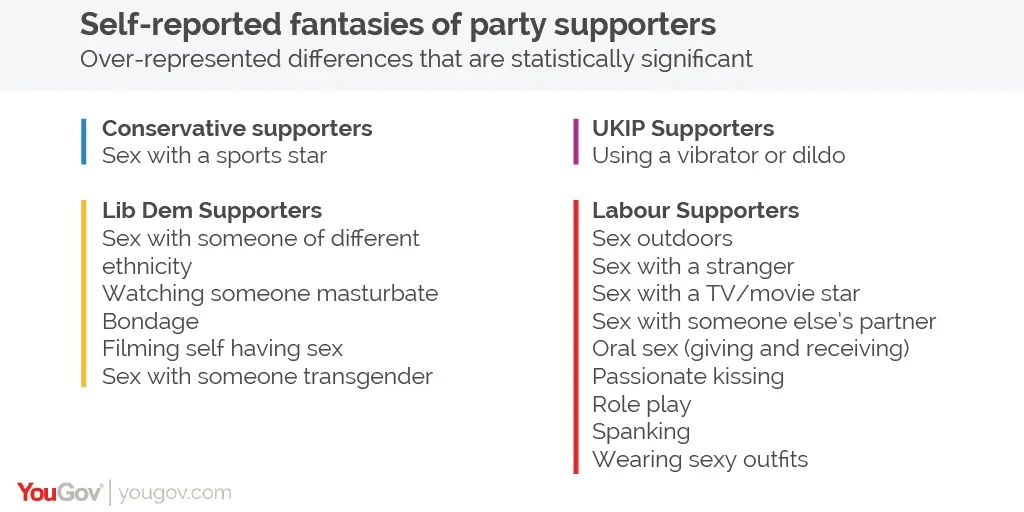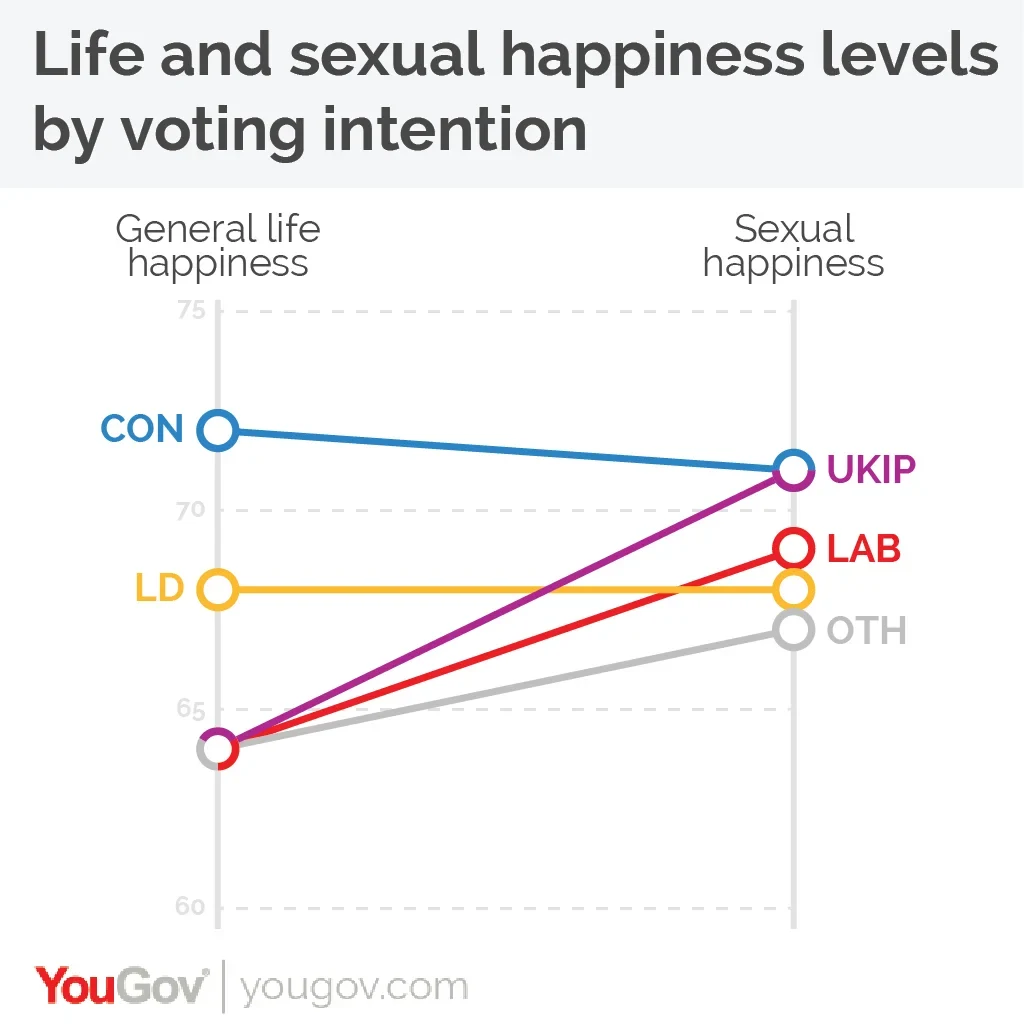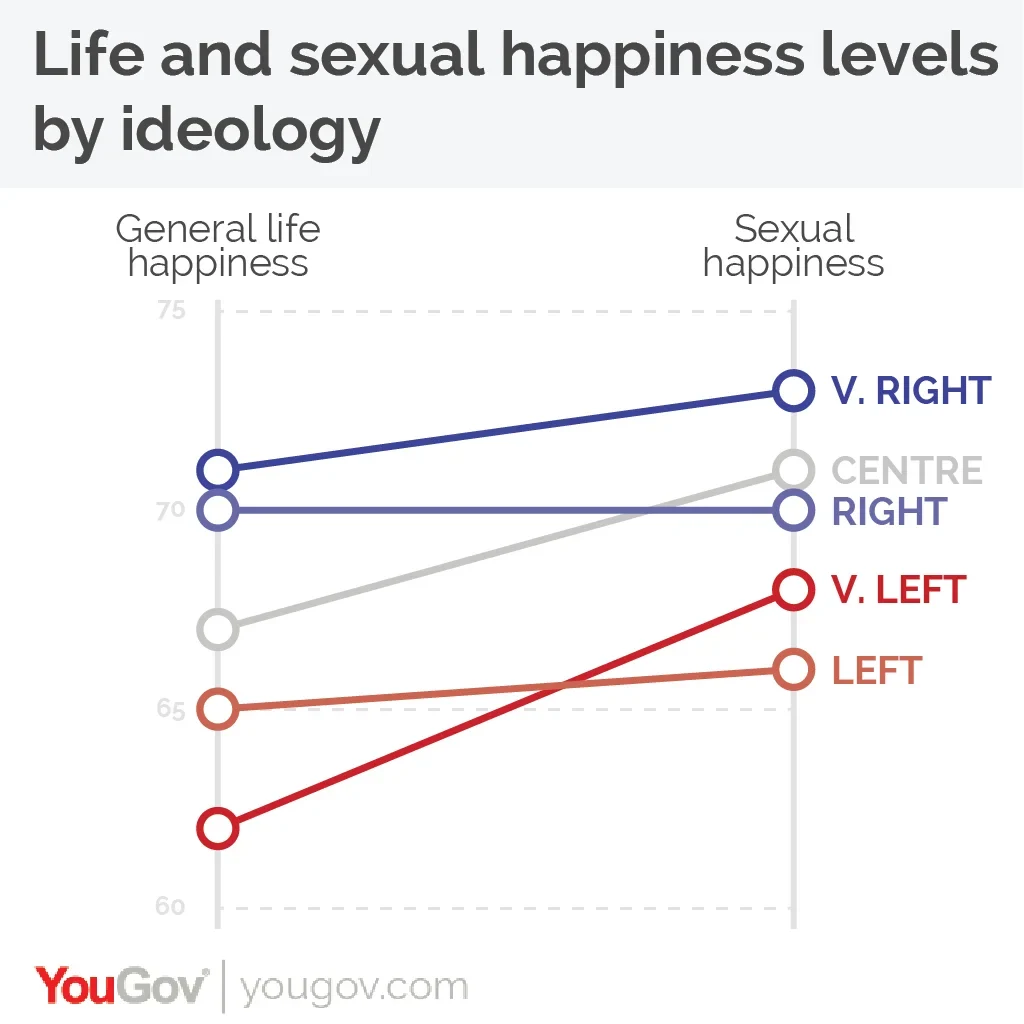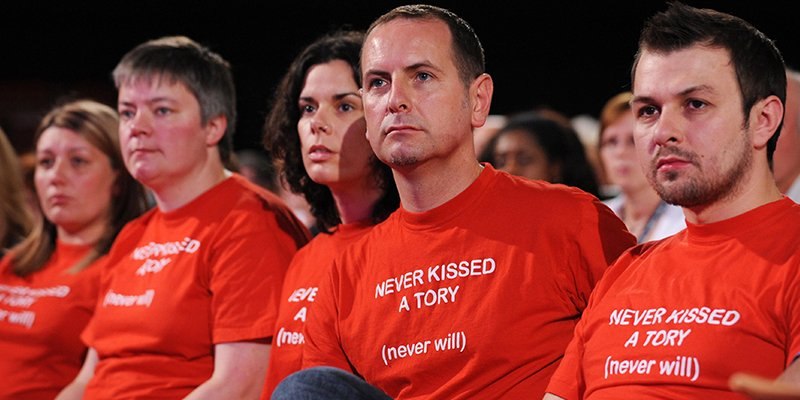Left wingers are less satisfied in the bedroom, finds Joe Twyman in the second volume of Sex, Lies and the Ballot Box
In my role as Head of Political and Social Research for YouGov I have rather a large number of survey questions looking at the relationship between sex and politics. This work has been for two volumes of Sex, Lies and the Ballot Box, a fantastic book series that looks at lots interesting and slightly off-the-wall aspects of political behaviour in Britain. Volume 1 came out at the end of 2014, Volume 2 came out a few days ago.
Often when people find out about my investigation into sex and politics they ask why? And how? But mostly ‘What did you find’?
In the interests of full disclosure I should say that the editors of this series of books, Philip Cowley and Rob Ford, are both good friends of mine. Very early on I suggested a chapter on sex as ‘the study no funding council would ever pay for’, but also because it was something in which I was personally interested. Who isn’t interested in sex and politics?
Anyway, I was originally inspired to do it by the description of a Conservative special adviser in The Thick of It as “disappointingly below par in the blowjob department”.
To me this quote is funny because it plays on an old (but I sense relatively widely believed) stereotype that Conservatives are frigid, unadventurous and generally not very adept when it comes to the sex. I was interested to know if that was actually true.
I also wanted to know if you could predict, with any degree of statistical accuracy, someone’s political support from their sexual fantasies or behaviour. Spoiler alert: You can’t (sadly).
The first set of results, for Volume 1, looked at specific sexual fantasies. It is worth clarifying at this point that a ‘sexual fantasy’ covers any ‘sexual thought’ – in other words a thought that elicits a sexual response. It can be, for example, something you already do a lot, something you have done before and want to do again, something you want to do but have not done and even something you never actually want to do, but just the thought of it arouses you.
Part of the survey asked people to pick their sexual fantasies from a list. The original long list of common fantasies was derived from a survey YouGov had worked on for the book Sex in the Psyche back in 2004. This sort of thing can only really be effectively done through the anonymity of online surveys for obvious reasons!
Such work had been conducted on a few occasions before, but not particularly well. The sample sizes tended to not be especially large and often the findings were based on spurious correlations. In other words UKIP supporters might favour putting X in Y, but what you’re really picking up is the fact that older males favour putting X in Y and UKIP supporters are more likely to be male and tend to be older. Plus the sub-sample of UKIP supporters within the survey would be small and so the findings would not be statistically significant anyway.
To deal with this, the analysis that was conducted controlled for significant demographic variables like age, gender, marital status and sexual orientation. Once these were taken into account, those fantasies that were statistically significantly more popular among supporters of one party compared to the others were identified. In other words it’s the fantasies that are more popular, not necessarily most popular. That’s how you get this final list:

I found the fact that Conservatives were, relatively speaking at least, conservative with their sexual fantasies really interesting. As were Ukippers. On the left Labour and the Lib Dems had a far longer list. The old stereotype seemed to hold. And no, I did not ask which sports stars Conservatives most wanted to fuck, but I wish I had!
For Volume 2 I conducted a new survey and moved away from sexual fantasies and behaviour to look instead at sexual satisfaction. We knew Conservatives were, statistically speaking, significantly less likely to have specific fantasies compared to supporters of other parties, but in absolute terms were they any less satisfied with their sex lives?
Those taking part in the survey answered a series of questions looking at how happy they were with their sex lives, but also how happy they were with their lives in general.
Respondents were asked ‘Taking all things together, how happy would you say you are?’ Their answers were recorded on a numeric scale ranging from 0 (Not at all) to 100 (Very happy). Using the same scale, this was then followed up with ‘Generally speaking, how happy would you say you are with your sex life?’ for those who said they were currently sexually active.
The data showed that sexual happiness, perhaps unsurprisingly, correlated strongly with general life happiness. For British adults as a whole the mean average score for sexual happiness was 70 out of 100, while for general life happiness the mean was a slightly lower 67 out of 100.

Among the supporters of different political parties Conservatives and UKIP supporters had the highest levels of sexual happiness, above the national average, while Labour, Lib Dem and supporters of other parties were lower. However, there was little in the way of meaningful differences between the groups.
The differences are slightly larger when it comes to general life happiness, but while Conservatives top that table too, Ukippers share the bottom with Labour and other voters. Once again the differences are not substantial, as the first chart shows.
Intriguingly supporters of Labour, UKIP and other parties are happier with their sex life than their life in general. In contrast Lib Dem supporters score both equally while Conservatives are happier with their life in general – if only just.

We also looked at the results by where respondents placed themselves on the left / right political ideology spectrum. This data was recorded in the survey using standard question wording and on a scale from 0 (Left) to 100 (Right). When the left / right placement was aggregated up into five groups a picture emerges (see second chart).
From these results above it does appear that, contrary to broad stereotypes (and cherry picked examples) it is those on the right of the political spectrum that are happiest with their sex lives, and indeed their lives in general, even if it is not actually by that much.
Important caveat time:
There are obviously a number of factors that might explain someone’s sexual happiness and these results do not suggest that changing your political views would make you happier in bed (or on the sofa, in the hotel elevator, in the bath and in the stationery cupboard at work).
With all of this the old rules about correlation not equalling causation always apply. Being very right wing and / or Conservative doesn’t make you sexually satisfied or fantasise about relatively few sexual scenarios, but nonetheless, these results suggest it is, in contrast to at least some stereotypes popular in the political world, those on the very right of the political spectrum who enjoy their sex life the most.










